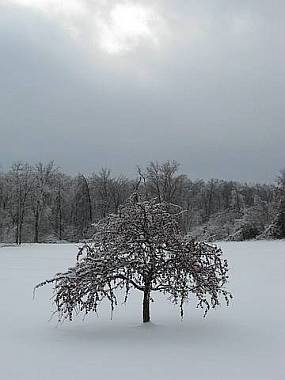 I did one of the dumbest things I’ve ever done this week. It may not seem like much at first glance, but it made for a lot of unnecessary work, pointless ponderings, and general angst.
I did one of the dumbest things I’ve ever done this week. It may not seem like much at first glance, but it made for a lot of unnecessary work, pointless ponderings, and general angst.
We got hit by a snowstorm, followed by an ice storm, followed by a snowstorm. As we live at the top of a hill, about fifty feet higher than the road that runs by our house, we need to navigate a steep drive. Snow makes this difficult, and we sometimes can’t get up our snow-choked driveway in my wife’s car, a Corolla.
On the other hand, I have a 4×4 pickup that laughs at snow and ice. No matter how bad a mess our driveway might be, I’m up it in a flash.
Which is why this last week was so stupid. I attempted to venture out after the storms had run their courses. I clear the driveway by first running my truck up and down it to create a basic, driveable path, then I spread halite in the treadmarks. In a day or so, the salt does its work and my wife’s car has no more troubles getting in and out.
Imagine my surprise when I turn my truck around to make the uphill jaunt and wind up in a ditch on the side of my driveway. Now imagine me scratching my head as to why, only to discover that I had the parking brake on.
Now a 4×4 is one of man’s greatest inventions, but it’s not magic. Run yourself into a watery, icy, muddy ditch and you’ve got troubles. My troubles amounted to 80 minutes of me pushing on the back end of my truck while my wife spun the wheels a lot. The truck stayed where it was, and I retreated to our warm house for a cup of coffee with a packet of cocoa dumped in for good measure.
The next morning, after the ground had refrozen, I got in the truck, put it in 4-wheel low, and promptly drove out as if nothing had happened.
None of this madness would have occurred if I’d released the parking brake before I first attempted to drive up the hill. As is wont with me, this amounts to a lesson that goes beyond 4-wheel-drive pickup trucks and icy driveways.
Nothing drives a church into a ditch faster than to have the spiritual parking brake on. How does that happen? When leaders fail to identify gifts in their congregants.
I don’t know when this failure first began, but somewhere in the Western Church’s life we gave up tapping the power of the next generation, leaving talented people unchallenged and underdeveloped. And the blame for this lies entirely on leaders of local churches. Entirely.
When you look at the model of the early Church, its leaders called out gifted people for ministry. The leaders identified the gifts in those folks and worked alongside them to tune those gifts for maximum performance.
Today, we’ve got bupkis in this regard. Instead, we rely on folks’ self-identification of their gifts, on spiritual gift inventories that are little more than wish fulfillment for many, and the result has been a lot of wheel-spinning and ditch-dwelling.
Personally, I think that it’s the role of every pastor, elder, and deacon to keep their spiritual eyes open to the giftings of people within their churches, then encouraging those gifts. This goes beyond just mentioning that so-and-so is needed in the nursery to watch the kiddies when the adults are worshiping. It’s an active one-on-one process that helps others grow into their giftings.
And this is spiritually discerned, too, which, in the end, is what dooms this endeavor in most churches. Too many leaders don’t know how to see with the eyes of the Spirit, instead relying on calling out someone’s natural abilities rather than their supernatural ones.
A church comes packed with people God gifts for service. Too often, though, those people become 4x4s with parking brakes firmly set, their service hampered because no one is there to guide them into the powerful workings of God’s gifts in their own lives.
A. W. Tozer calls this error a tragedy, and I agree. It’s a tragedy that persists through the generations as we fail to meet the obligation to develop our fellow Christians into all God would desire they become. Instead, we’re satisfied with a pittance of the power available to us. So we run off into one ditch after another and fool ourselves into thinking that this constitutes the abundant life.
Please God, give us the guts and smarts to release the brake.

 I feel strongly that one of our greatest failings in our churches is that our spiritual leaders are not calling out the gifts in people. By that I mean that too many churches rely on people self-identifying their own spiritual gifts rather than the leadership of the church doing it. Of course, this necessitates that the leaders of a church actually KNOW their people well and spend time helping each individual cultivate the gifts (and talents) God has given them. (Kind of precludes being an anonymous face in a megachurch, doesn’t it?)
I feel strongly that one of our greatest failings in our churches is that our spiritual leaders are not calling out the gifts in people. By that I mean that too many churches rely on people self-identifying their own spiritual gifts rather than the leadership of the church doing it. Of course, this necessitates that the leaders of a church actually KNOW their people well and spend time helping each individual cultivate the gifts (and talents) God has given them. (Kind of precludes being an anonymous face in a megachurch, doesn’t it?)